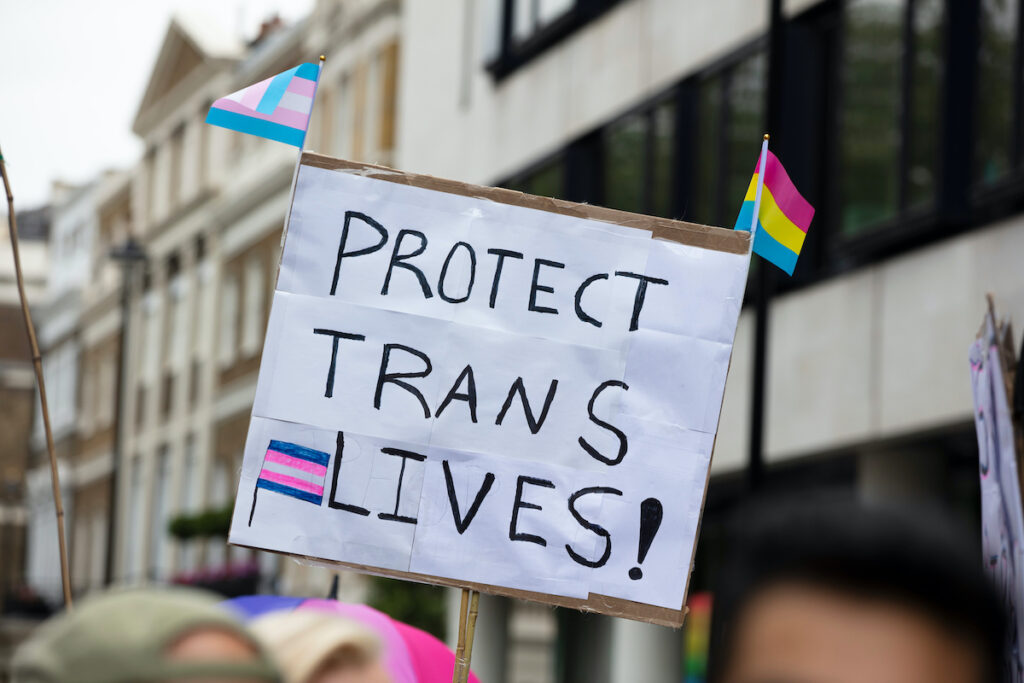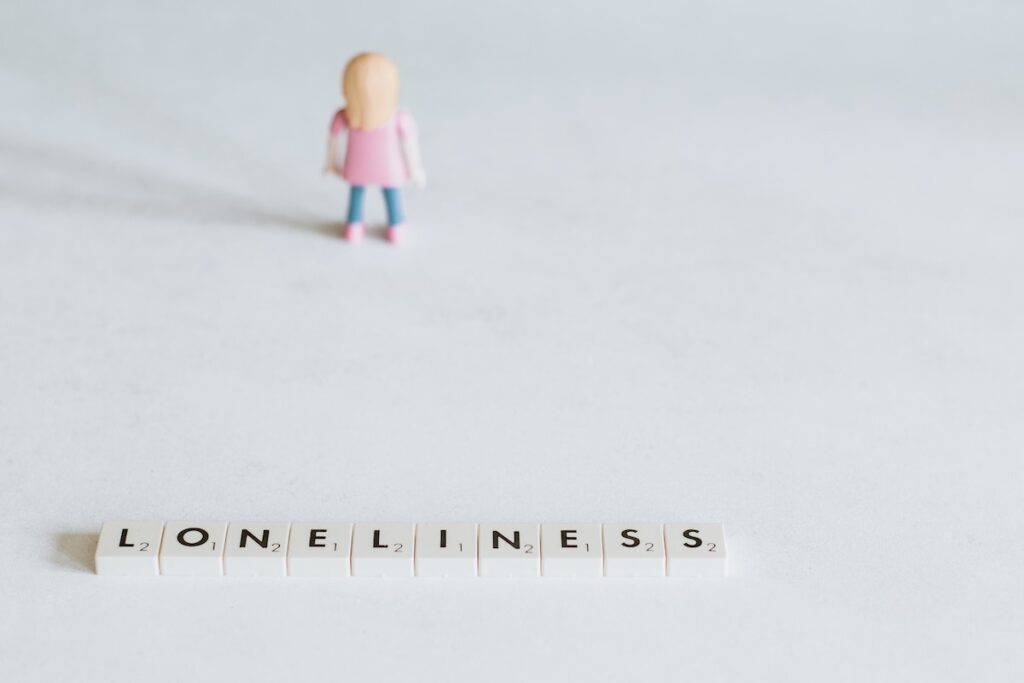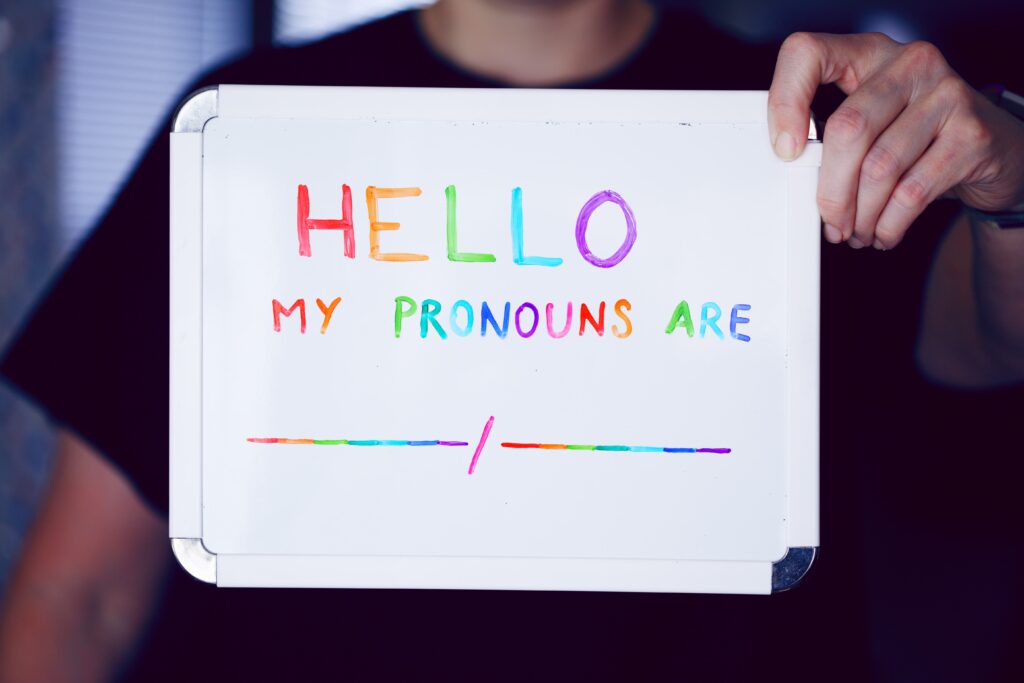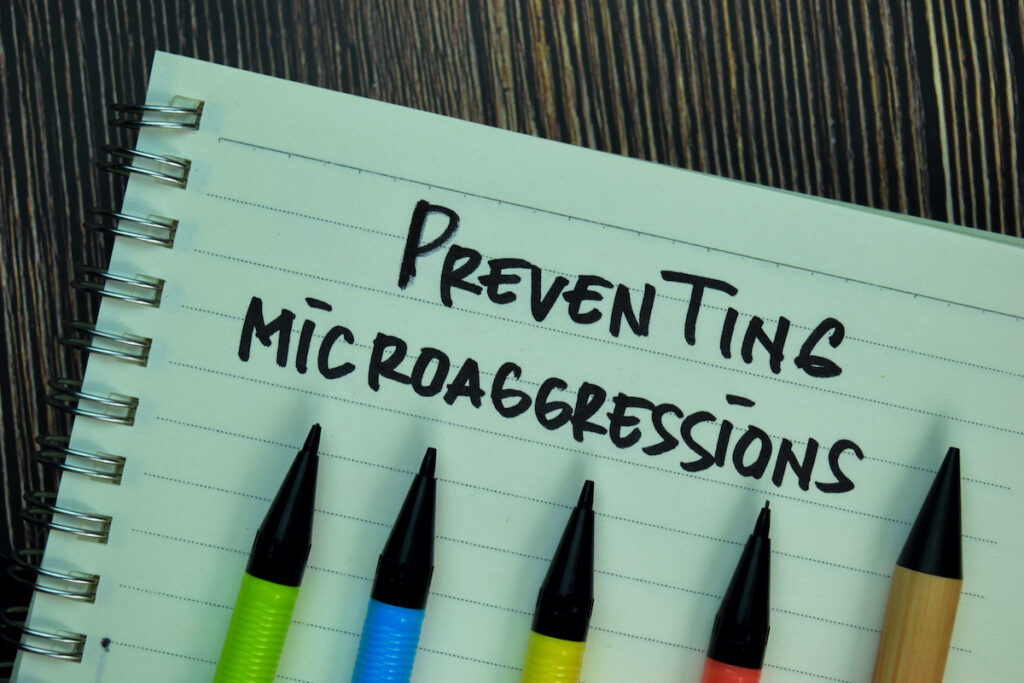
Microaggressions are simply defined as brief, commonplace daily verbal and/or behavioural slights or indignities that display hostility towards marginalised and minoritised people (Nadal et al, 2018). This definition can at times be quite confusing, so what are microaggressions and what do they do?
There are infinite examples of microaggressions. In my work, I have tried to balance what constitutes “micro”. There is nothing micro about the violence caused by these interpersonal acts, however, they seem to denote an experience that is difficult to react to accordingly. For many, microaggressions are those off-handed comments or generalisations, which unknowingly (at times) to the speaker, have caused offence. I question the “micro” nature as we know that microaggressions have a cumulative impact on the mental wellbeing of marginalised communities. Kevin Nadal is often credited for popularising the term microaggressions in the psychological literature. Their work highlights that for people of colour, and especially Black people, when microaggressions are experienced frequently, depression and suicidality increase (Nadal et al, 2014). For sexual minorities, the picture is clear as well, sexual orientation microaggressions have a deleterious impact on mental health wellbeing.
For trans and non-binary people, the experience of microaggressions is seldom investigated, but the literature is growing, indicating that as expected the more microaggressions experienced by gender minorities, the bigger the impact on wellbeing (Chang et al, 2015; Morris et al, 2020).
This blog is going to discuss the issue of microaggressions further by highlighting the findings from Eric Wesselmann et al’s (2021) recent US study. I will summarise the paper and offer tangible ways that practicing mental health workers can help minimise microaggressions and understand better how they can work with trans and non-binary people.

Microaggressions are defined as ‘brief, commonplace, daily verbal and/or behavioural slights or indignities that display hostility towards marginalised people. This study by Wesselmann and colleagues aims to understand the negative psychological effects of microaggressions on trans and non-binary people.
Methods
This overarching project used a mixed-methods approach, however, this paper reports only on the quantitative component. The paper reports on three experimental studies which aim to examine how microaggressions against trans people may be considered a form of social exclusion.
In studies 1 and 2 participants were grouped under a control or microaggression condition. For simplicity, the control was a condition where the participant was asked to reflect on the previous Wednesday evening and asked to describe in as much detail what they had done and how they felt. For the microaggression condition, participants needed to recall a time when they experienced a microaggression because of their gender identity, and once again asked to describe how they were feeling at the time.
In study 3 there was a focus on being misgendered purposefully, which constitutes a specific microaggression, this was then compared directly with social exclusion because of gender identity.
To measure social exclusion, they asked questions related to perceived relational value. This essentially wishes to gain a value of one’s need to belong and be valued socially.
Results
In total, 45 participants took part in study 1, 61 took part in study 2, and 90 participants were recruited to study 3. Most participants were white in all three studies (76%, 41%, and 49% respectively) and the mean ages ranged between 22 and 31 years between all three studies.
So, what did they find?
In study one, it was found that those in the microaggression group had lower perceived relational values compared to the control group, and had higher levels of feeling ignored, excluded, and pain. Study two replicated these findings with a different group, finding that again those in the microaggression group felt more excluded. The findings from studies one and two provided evidence that transgender people recalled the negative effects of microaggressions in a similar vein to that of other forms of social exclusion.
Study three highlighted the complex nature of this relationship, whilst it generally replicated the findings from studies one and two. The results highlighted that whilst participants who experienced microaggressions that focused on their gender identity was similar to being explicitly socially excluded due to their gender identity, these were not experienced in the same manner, instead, it was experienced in degrees of aversiveness. This means that the impact for those who experienced microaggressions related to gender identity did not differ from outright social exclusion. These, however, were not experienced in the same fashion, rather in how aversive the event/microaggression was.

The authors indicated that trans participants in this study experienced microaggressions similarly to how people would experience social exclusion, including feeling ignored, rejected, and ostracised.
Conclusions
This research suggests that microaggressions are as impactful on trans people as outright displays of discrimination and social exclusion. These are often minimised by wider society, however, the results of this research indicate they are just as harmful.

This research suggests that microaggressions are as impactful on trans people as outright displays of discrimination and social exclusion.
Strengths and limitations
This study takes a novel and fascinating approach to how microaggressions may constitute a form of social exclusion. The analyses are robust, meaning they are relatively trustworthy.
Nonetheless, as the authors note themselves, the sample size is small, and whilst enough to power their analysis (i.e. enough participants to detect differences between groups if a difference is to be detected), there is still the issue of small-scale studies which may not be representative of the community they are studying.
The authors are good at highlighting what is wrong with the study and where it has fallen short. Another point that came to mind is the fluidity of gender identity and expression. The authors used a binary approach to gender and neglected the inclusion of non-binary or otherwise gender-expansive individuals. Non-binary people are at an increased risk of social exclusion due to many factors; yet, I would argue that due to the lack of legal recognition, misinformation, and invisibility of non-binary people, social exclusion and microaggressions are experienced frequently. Consequently, we are unable to draw any conclusions here.

The study approaches microaggressions as a form of social exclusion in a robust way, however, this is a small-scale study and may not be representative of the trans community.
Implications for practice
Now that we have had a whirlwind tour of the paper, I want us to turn our attention to what we can do about reducing the experiences of microaggressions and fostering affirmation and inclusivity in practice.
Practitioners need to reflect on their own clinical practice and how their comments may be received and internalised by trans and non-binary clients and/or service users. Affirmation is frequently misunderstood by mental health practitioners who see it as encouragement towards transition, such as gender affirmative interventions like hormones or surgery, or indeed in engaging with a social transition. However, affirmative approaches do not advocate encouragement. Affirmation is meeting the person where they are on their specific journey and engaging with their needs holistically.
Why is this important? An approach that isn’t centred on affirmation is open to opportunities for microaggressions. Misgendering and dead-naming (using someone’s name prior to transition) is automatically making a stance on what you believe the person is, which is at odds with the reality of the situation, and you have made a situation unsafe and inaccessible to your client and/or service user. Dismissing experiences of transphobia, or indeed diminishing those feelings will also have a similar impact, making trans and non-binary people feel like they can’t trust their experiences. Experiencing these microaggressions consistently across mental health practitioners results in feeling unable to trust services, thus, delaying the seeking of care when it is needed.
We also must think critically about how intersectionality plays a role in the experiences of microaggressions, and subsequently social exclusion.
So how can you make your practice more inclusive? Consult with community members, organise with communities to deliver effective training around trans lives, co-produce interventions and be receptive to learning. Reading this blog may be one such way of starting your journey towards an affirming and inclusive service for trans and non-binary people. It is important to engage with trans-led charities that offer tailored training interventions to healthcare services, such as Gendered Intelligence, GIRES, Stonewall, Mermaids.

Mental health practitioners need to reflect on their own assumptions and approach their non-binary and trans service users with affirmation to meet their needs holistically.
Statement of interests
For transparency, I am currently conducting a large cross-sectional survey into the experiences of microaggressions and their impacts on suicidality, anxiety, and depression amongst trans and non-binary people. The TRans And Non-binary Suicidality (TRANS): Microaggressions & Mental Health project is currently recruiting and can be accessed here.
Links
Primary paper
Wesselmann, E. D., DeSouza, E. R., AuBuchon, S., Bebel, C., & Parris, L. (2021). Investigating microaggressions against transgender individuals as a form of social exclusion. Psychology of Sexual Orientation and Gender Diversity. Advance online publication.
Other references
Photo credits
- Photo by Külli Kittus on Unsplash
- Photo by Brielle French on Unsplash
- Photo by Markus Spiske on Unsplash
- Photo by Pawel Czerwinski on Unsplash
- Photo by Sharon McCutcheon on Unsplash
